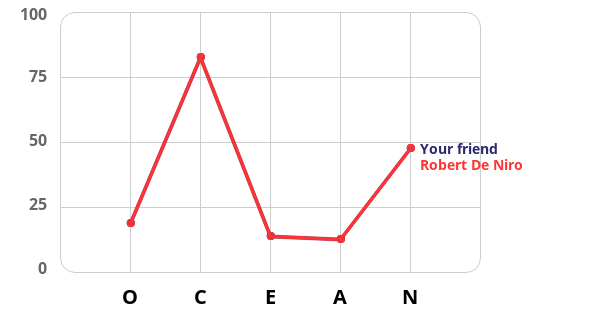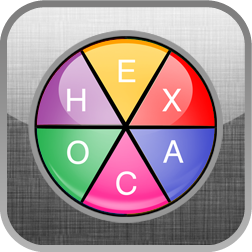Big Five Movie Star Test
You are here because one of your friends linked you to his or her Big Five Movie Star Test result.
Take the testYour friend is the most like:
Robert De Niro


Compared to the general population, your friend is:
- Low on Openness
- High on Conscientiousness
- Extremely low on Extroversion
- Extremely low on Agreeableness
- Average on Neuroticism
According to scientific data compiled by the Ph.D.s Dana R. Carney, John T. Jost, Samuel D. Gosling, and Jeff Porter, your friend's scores indicate that he or she is:
- Practical, realistic.
- Likely to use more pauses in their speech than the average person.
- Definite, persistent, and tenacious.
- Reliable, responsible, orderly, and organized.
- Someone who doesn't give up easily.
- Likely to maintain more seconds of eye contact in a conversation than the average person.
- Likely to use fewer hand movements and gesticulations in a conversation than the average person.
- Withdrawn, reserved, and introverted.
- Argumentative, analytical, and hard-headed.
- Critical, someone who gets even when wronged.
According to Geoffrey Miller, professor of psychology at the University of New Mexico, these slogans are likely to describe your friend's personality and outlook on life:
- "Gun control means using both hands."
- "If God didn't want us to eat animals, he wouldn't have made them out of meat."
- "Arugula is a weed, not a vegetable."
- "Just because you can, it doesn't mean you should."
- "The harder I work, the luckier I get."
- "A goal is a dream with a deadline."
- "Today is the tomorrow that you forgot to plan for yesterday."
- "If cats could talk, they wouldn't."
- "People should come with an 'off' button."
- "I take a long time to warm up to strangers."
- "People suck and that's sad."
- "Just because I'm here, it doesn't mean I care."
- "Yes, I'm good at that. No, I won't help you with it."
- "I'm not good at empathy, will you settle for sarcasm?"
According to a study done by the Ph.D.s Dana R. Carney, John T. Jost, Samuel D. Gosling, and Jeff Potter, your friend's scores indicate that he or she is:
- More likely to own sports merchandise or décor than the average person (posters, caps, shirts, etc.).
- More likely than the average person to have a wall calendar in their home.
- More likely than the average person to own a flag (e.g. the flag of their country).
- More likely than the average person to have organized the books and records in their home into some orderly system.
- More likely than the average person to dislike reggae music.
According to peer-reviewed studies from Texas AM University (US), Pepperdine University (US), Cambridge University (UK), and Sejong University (Korea), your friend's scores indicate that he or she is:
- More likely than the average person to want their political representatives to stick to their guns and fight for their issues as opposed to seeking compromises and curbing their solutions.
- More likely than the average person to judge people by their actions, rather than by their words.
- More likely than the average person to have had a favorable view of the 2003 American invasion of Iraq.
- Less likely than the average person to care about the ambience of a hotel where they are staying, being more concerned with its quality and service.
- Less likely than the average person to buy something unexpected and fun that they stumbled across while shopping.
- More planful, organized, and goal-directed than the average person.
- More in favor of using military action to solve foreign policy disputes than the average person.
- Less likely than the average person to cheat on their homework and exams.
- Less likely than the average person to treat themselves to a little extra luxurious something when shopping.
- More deliberate and thorough in their actions than the average person.
- Someone who spends less time following the news and latest happenings than the average person.
- Less likely than the average person to attempt to enlist their friends and acquaintances to get behind the political issues that they support.
- More likely than the average person to be perceived as critical, cold-headed, and detached.
- More likely than the average person to make good decisions on their own, without the input of others.
- More likely than the average person to support the use of capital punishment.
- Less likely than the average person to try and strike up a compromise when making a decision, tending to go directly for what they want.
- Less likely than the average person to return to a chain of hotels or bed and breakfasts that they've used in the past and enjoyed.
According to a scientific study done by the Ph.D.s Gokul Chittaranjan, Jan Blom, and Daniel Gatica-Perez, your friend's scores indicate that if he or she own a smartphone he or she is:
- Likely to spend more time texting than the average person.
- Less likely to use internet apps on their smartphone than the average person.
- More likely to use productivity apps like (MS Office) on their smartphone than the average person.
- Less likely to use entertainment apps (like games, audio, and video) on their smartphone than the average person.
- Likely to feel that a lot of the calls they receive on their phone are "unwanted."
Take Next
GET THE FULL STORY
Become a lifetime member with a one-time payment
WHAT YOU GET
Access to members-only tests
Ability to track and save test results
Access to all of our eBooks (value $44.94)
Access to premium type assessments and infographics
Become a memberSave and monitor your results over time
Become a member today
Sign Up











